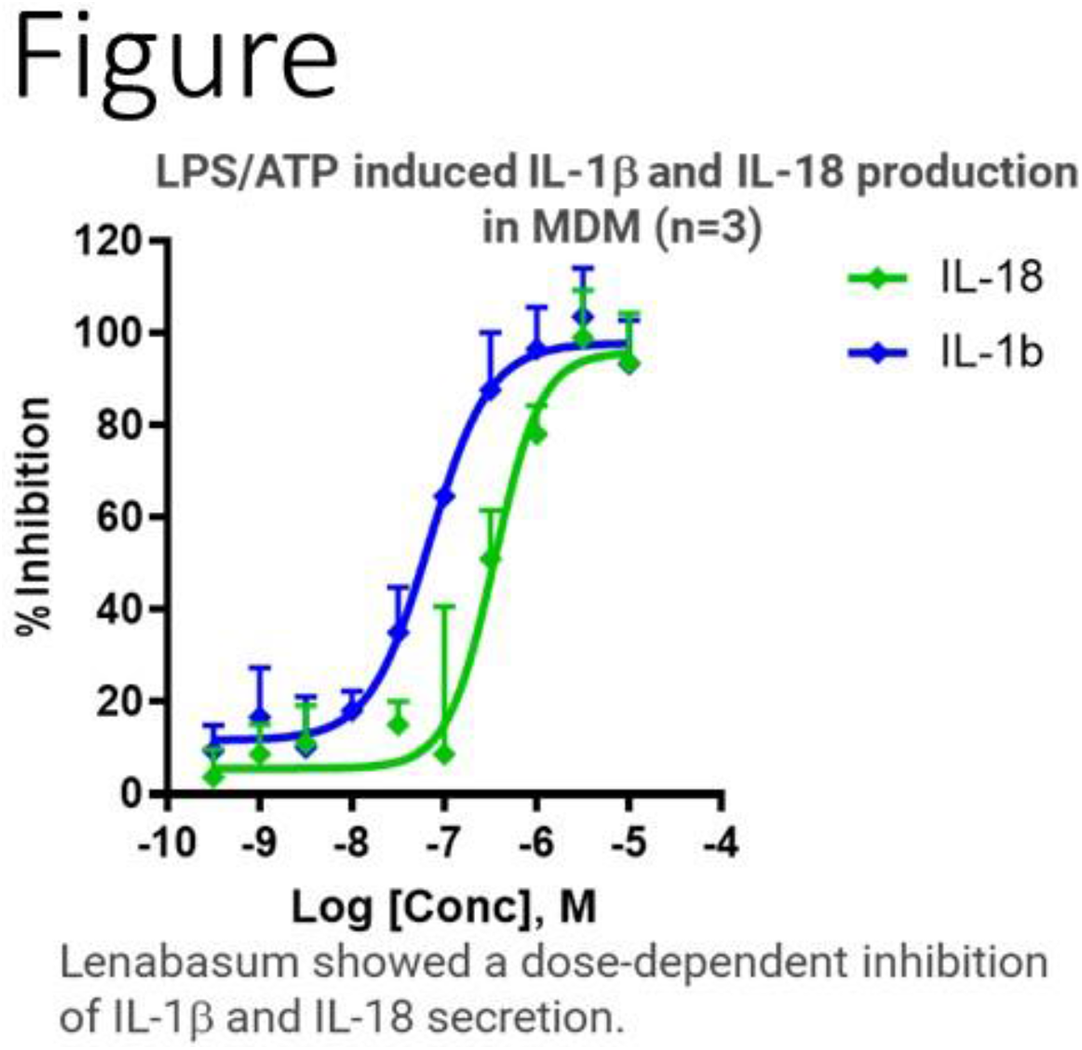

Background: Upregulation of the innate immune response via the activity of Toll-like receptors and the NLRP3 inflammasome have been suggested as initiating events that can drive fibrosis in systemic sclerosis (SSc) (Pharmacol Ther. 2018;192:163). Lenabasum, a cannabinoid receptor type 2 agonist, is known to activate the resolution phase of acute human innate immune responses triggered through Toll-like receptor activation, favoring production of pro-resolving lipid mediators, reducing inflammatory infiltrates, and increasing bacterial clearance (Clin Pharmacol Ther. 2018;104:675). Given the potential importance of inflammasome activation in the pathogenesis of SSc, the question remained whether lenabasum inhibits inflammasome activation.
Objectives: Assess effects of lenabasum on IL-1β and IL-18 production induced by inflammasome activation.
Methods: Primary human macrophages were derived from monocytes, stimulated with LPS and ATP to active inflammasomes and cultured with lenabasum. Levels of IL-1β and IL-18 were measured in cell supernatants by ELISA. Separately, human PBMC were activated with 0.1 µg/ml LPS ± 10 µM lenabasum for 24 hours, and effects of lenabasum on the levels of IL-1β and other pro-inflammatory cytokines were measured.
Results: Lenabasum significantly inhibited IL-1β and IL-18 secretion by monocyte-derived macrophages, with IC 50 = 66.73 ± 3.92 nM and 349.23 ± 21.27 nM, respectively. A control inflammasome activation inhibitor, MCC950, which showed IC 50 = 18.33 ± 1.22 nM for IL-1 β inhibition and IC 50 = 21.43 ± 0.81 nM for IL-8 inhibition.
Conclusion: Lenabasum inhibits inflammasome activation, which could contribute to potential therapeutic efficacy in SSc and other autoimmune diseases.
REFERENCES:
[1]Henderson, J., S. Bhattacharyya, J. Varga, and S. O’Reilly. 2018. ‘Targeting TLRs and the inflammasome in systemic sclerosis’, Pharmacol Ther, 192: 163-69.
[2]Motwani, M. P., F. Bennett, P. C. Norris, A. A. Maini, M. J. George, J. Newson, A. Henderson, A. J. Hobbs, M. Tepper, B. White, C. N. Serhan, R. MacAllister, and D. W. Gilroy. 2018. ‘Potent Anti-Inflammatory and Pro-Resolving Effects of Anabasum in a Human Model of Self-Resolving Acute Inflammation’, Clin Pharmacol Ther, 104: 675-86.

Disclosure of Interests: Subba Chintalacharuvu Shareholder of: Corbus Pharmaceuticals, Inc., Employee of: Corbus Pharmaceuticals, Inc., Ping Zang Employee of: Corbus Pharmaceuticals, Inc., Barbara White Shareholder of: Corbus Pharmaceuticals, Inc., Employee of: Corbus Pharmaceuticals, Inc., Sergei Atamas Shareholder of: Corbus Pharmaceuticals, Inc., Employee of: Corbus Pharmaceuticals, Inc.